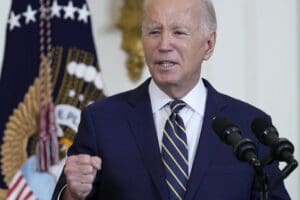U.S. economic growth stronger than expected following passage of 'Bidenomics' policies
The Department of Labor reported earlier this month that inflation growth decreased in June to the lowest level since 2021.

The Department of Commerce said on Thursday that the U.S. economy grew at an annual rate of 2.4% in the second quarter of 2023, better than the 2% that had been forecast by Dow Jones’ panel of economists. The department’s report and other positive economic news follows the passage of multiple pieces of legislation focused on economic stabilization and growth, which President Joe Biden has taken to calling “Bidenomics.”
The rise in gross domestic product makes this the fourth straight quarter of growth, beginning in the third quarter of 2022. The report shows that increases in consumer spending were a major contributor to growth, with an increase of 1.6% accounting for 68% of all economic activity during the quarter.
“The economy is growing and we’re lowering costs for families. That’s Bidenomics at work,” Biden said in a statement in response to the report. “This progress wasn’t inevitable or accidental — it is Bidenomics in action, growing the economy from the middle out and bottom up, not the top down.”
The GDP report follows a July 12 report from the Department of Labor that inflation growth decreased in June to the lowest level since 2021.
House Speaker Kevin McCarthy said in a speech on the House floor on July 28, 2022, “President Biden and Congressional Democrats’ radical policies have created an economic recession.”
In reality, the last time the economy was in a recession was in the third quarter of 2020, when former President Donald Trump was in office.
When Biden took over from Trump, the economy was in a precarious state as the country dealt with the ongoing COVID-19 pandemic. The unemployment rate was at 6.3% in January 2021 and had reached as high as 14.7% in April 2020. The current unemployment rate is 3.6%.
Since Biden took office, 13 million jobs have been added to the economy. By comparison, 3 million jobs were lost under Trump, and he is the only president to leave office with a record of job losses.
Biden has signed several pieces of major legislation since taking office that have been intended to boost the economy: the American Rescue Plan, the Infrastructure Investment and Jobs Act, the CHIPS and Science Act, and the Inflation Reduction Act. The Rescue Plan was designed to stimulate the economy following COVID-19, and the other pieces of legislation contain major components designed to spur economic investment and employment.
Legislation that Biden has signed into law has emphasized either direct government spending on projects or tax incentives for companies to build businesses and facilities in the U.S., with an emphasis on domestic union job creation.
The Biden administration has adopted “Bidenomics,” which was initially a pejorative term coined by observers on the right, to refer to the economic philosophy linking together the bills championed by the White House.
The administration says its policies are meant to emphasize investment in economic policies favoring the middle class, as opposed to conservative “trickle-down” policies, based on the claim that economic benefits provided to the wealthiest individuals and corporations will make their way down to those less wealthy. One example of such policies is the 2017 Tax Cuts and Jobs Act, signed into law by Trump, which cut taxes for large businesses and the very wealthy.
“Here’s the simple truth about trickle-down economics: It didn’t represent the best of American capitalism, let alone America. It represented a moment where we walked away from how this country was built, how this city was built,” Biden said in remarks on June 28 in Chicago. “Bidenomics is about the future. Bidenomics is just another way of saying: Restore the American Dream because it worked before.”
Published with permission of The American Independent Foundation.
Recommended

Biden calls for expanded child tax credit, taxes on wealthy in $7.2 trillion budget plan
President Joe Biden released his budget request for the upcoming fiscal year Monday, calling on Congress to stick to the spending agreement brokered last year and to revamp tax laws so that the “wealthy pay their fair share.”
By Jennifer Shutt, States Newsroom - March 11, 2024
December jobs report: Wages up, hiring steady as job market ends year strong
Friday’s jobs data showed a strong, resilient U.S. labor market with wages outpacing inflation — welcome news for Americans hoping to have more purchasing power in 2024.
By Casey Quinlan - January 05, 2024
Biden’s infrastructure law is boosting Nevada’s economy. Sam Brown opposed it.
The Nevada Republican U.S. Senate hopeful also spoke out against a rail project projected to create thousands of union jobs
By Jesse Valentine - November 15, 2023








































































